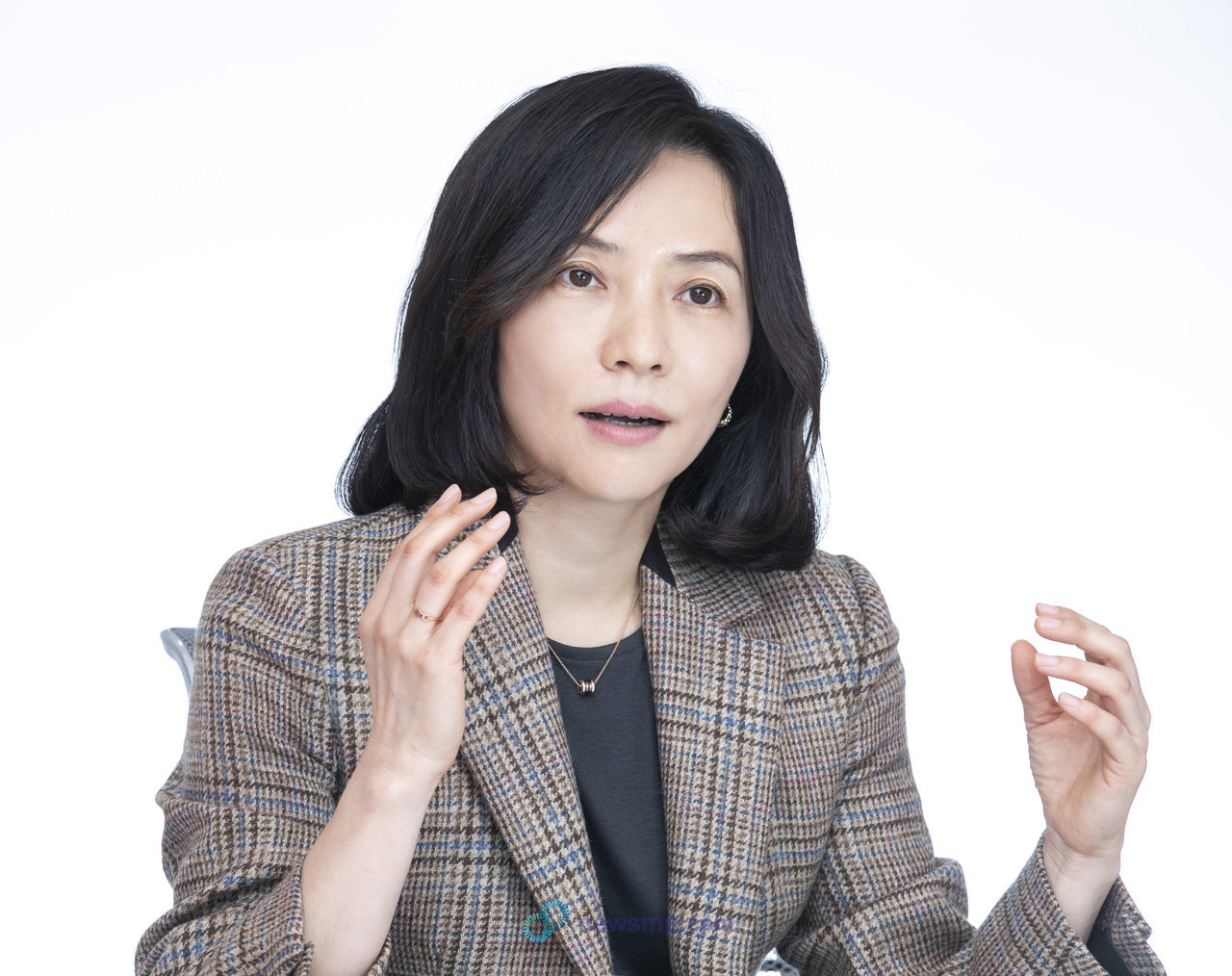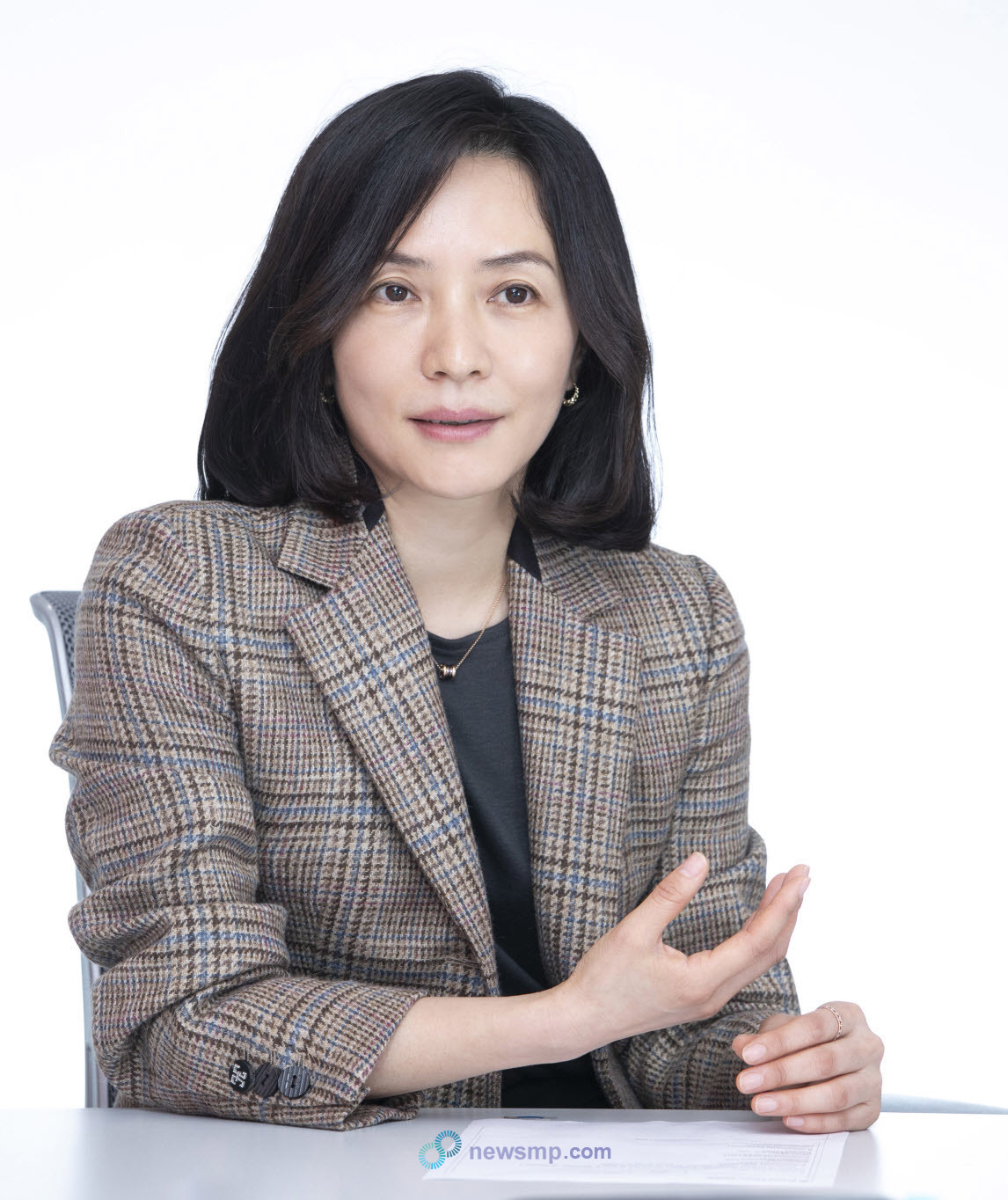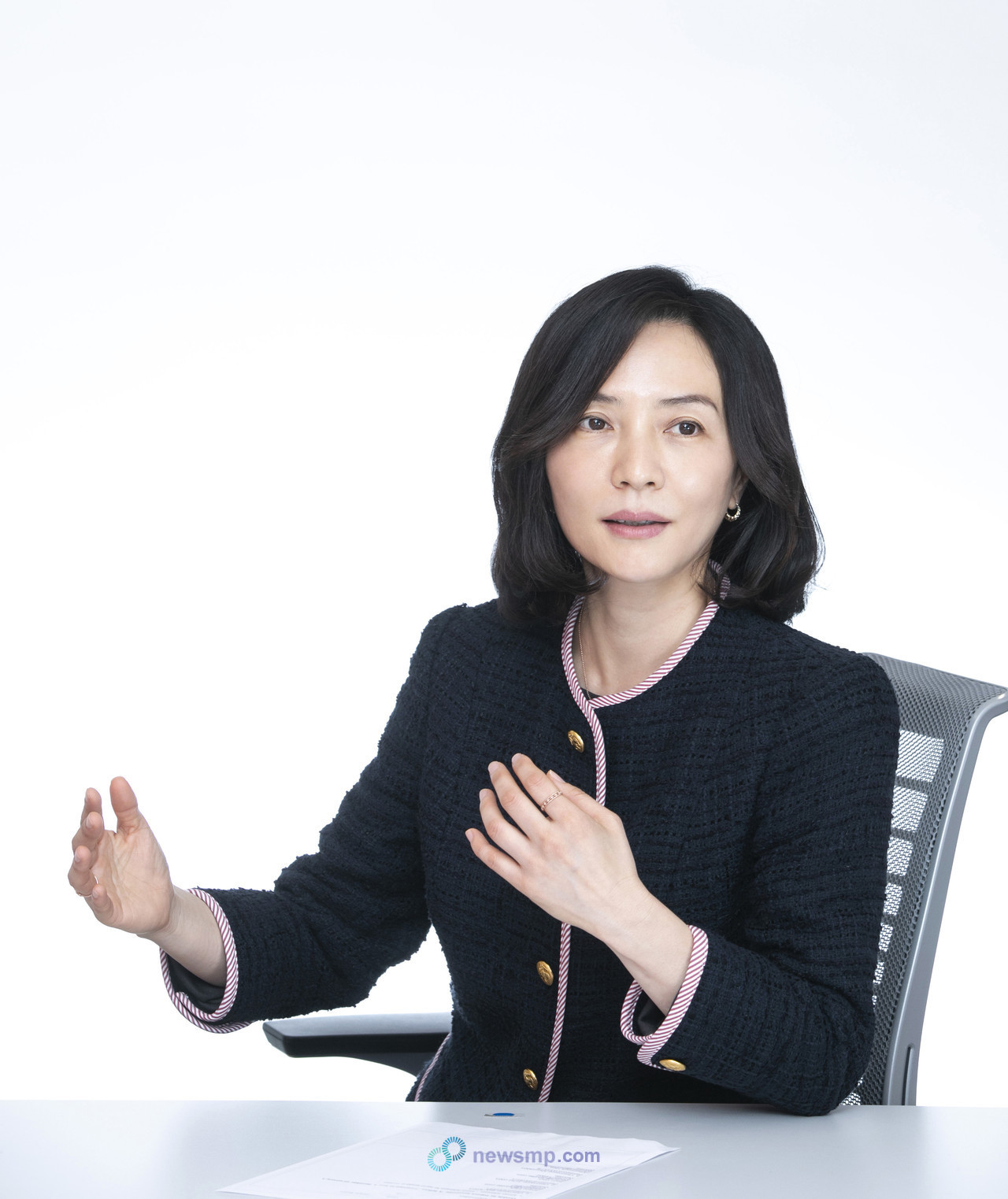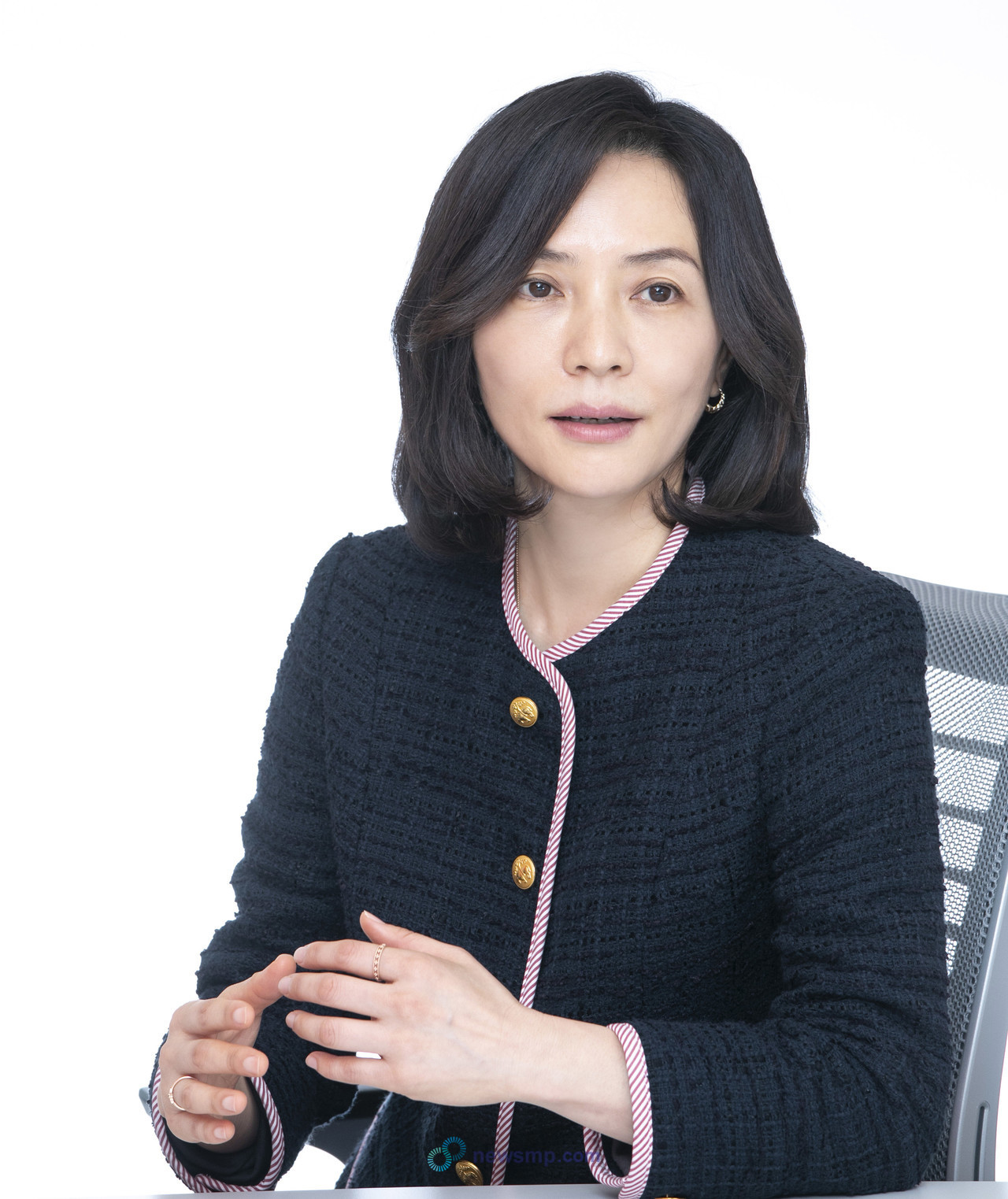[Newsmp]
The DNA of BMS is cooperation.
Country manager Lee Hye-Young, who led the launch of Viatris Korea, recently moved to Bristol Myers Squibb (BMS) Korea.
After graduating from Seoul National University College of Pharmacy and earning an MBA from Korea University, Lee entered the pharmaceutical industry as a clinical development expert.
For the next 25 years, she built her career in various departments such as business development, strategy planning and marketing, and she served as a country manager of Pfizer Singapore and vice president of Pfizer Korea.
Recently, Lee led Viatris Korea’s process of spin-off and independence from Pfizer as a country manager of Viatris Korea.
While Viatris was reborn as a start-up from Pfizer’s Upjohn division, BMS also faced a major inflection point.
BMS has made a mega-big deal to acquire Celgene, one of the global leaders in the blood cancer field.
Since then, BMS has secured a growth engine by acquiring biotech companies with technology such as MyoKardia and Turing Point Therapeutics.
In addition to the solid portfolio previously possessed by BMS and Celgene, the new country manager Lee was given the task of successfully establishing the newly acquired pipeline in the domestic market.
It is also a new opportunity for Lee, who has accumulated extensive experience in various business divisions in the pharmaceutical industry for the past 25 years.
A group of multinational pharmaceutical company journalists met with BMS Korea country manager Lee Hye-Young, who joined at the turning point of BMS and heard about the vision and aspiration of BMS, which is being reborn as a global big pharma through a series of mergers and acquisitions.

◇A new challenge with BMS in 22 years
Since joining Pfizer in 2000, Lee has virtually built various careers in the company for 22 years, from the Upjohn division to the establishment of Viatris Korea.
She was appointed as the country manager of BMS Korea on Aug. 10 and gave it meaning as a ‘new challenge in 22 years.’
“After working in the pharmaceutical industry for about 25 years, including Pfizer, Viatris, and Roche, I started working in clinical research and experienced various functions such as business development, strategy planning, and marketing,” Lee said. “Aside from that, I worked overseas in Shanghai, Hong Kong and Singapore, as a strategy lead in charge of the Asia Pacific region, and then returned to Korea about six years ago after serving as the head of the Singapore branch.”
“I have had various experiences, and I always love to learn and grow through new challenges, and I feel rewarded in making meaningful changes with my employees,” she added. “Now I am taking on a new challenge at BMS, and I am here to greet you.”
Lee also gave meaning to changing her position, “I like working hard and passionately (if it is something I have to do anyway). After joining Pfizer in 2000, I went through the process of preparation and settling for the launch of Viatris, and now I have a new challenge in 22 years.”
“For 22 years, I have gained and challenged a lot of different experiences within an organization, and it feels very rewarding to learn new things, quickly build trust with new people, and make something together,” Lee expressed her feeling. “So I think I ran very hard without knowing it was hard.”
◇BMS’s culture of active cooperation is stronger than seen from the outside
Lee recalled that she was quite surprised by the stronger than expected pipeline and global status. The BMS’s business was larger than what was seen from the outside, and it was a solid company.
But she said that she was more astonished by the robust organizational culture. Lee explained that positive energy is being gained from a culture of active cooperation.
“If I saw it from the perspective of a colleague in the same industry before joining BMS, I was surprised in many ways after seeing the reality,” she said. “BMS’s business size, global status, and pipelines were much stronger than I knew, and there were especially diverse promising pipelines to lead the industry.”
"It is still a short period of time, but what I felt while interacting with Korean executives and employees and BMS colleagues from other countries who work closely with me is that we are really actively cooperating with each other and sincerely committed to innovation," Lee added. “We are getting positive energy from this aspect.”
In particular, Lee evaluated the company as one team, “What was very impressive after taking office is the culture of cooperation within the organization. Even though the organization has grown and has more work to do after the merger, we have formed a real one team based on the organizational culture to help and cooperate with each other.”
“We will have to learn more through interactions and conversations with various employees in the future, but the culture of actively cooperating with each other was very impressive,” she said. “All BMS workforces have the best expertise in their respective fields, and when they have a common goal, a culture of helping each other beyond the department is strongly formed.”
Moreover, Lee added, “We have a very energetic and active employee participation culture. We recently had a social contribution activity called ‘Steps for Patient’ as part of the Global Patient Week by BMS around the world at the same time, and 80% of employees attended in major cities across the county, including Seoul.”
Lee showed pride in this culture, “This event is more meaningful in that our employees came up with the idea and even took charge of the implementation. The reason we were able to do this is probably that the employees have in their hearts that they can help patients in various ways other than treatment.”
The pipeline has become richer through successive mergers and acquisitions, and there are many challenges to solve, but Lee was confident that she would be able to solve them well together with her employees.
It is the will to create a foundation for employees to participate more actively in a cooperative organizational culture.
“At this moment, the part I want to try together, and the most important thing is to introduce new treatments to Korea as soon as possible. However, there are new challenges to be solved when considering various environments and situations,” she premised.
"We expect our employees, who have a large contact with patients and medical staff, to actively express their opinions in the process of solving these tasks based on their understanding of patients and medical staff."
Lee added, "What I am passionate about in terms of organizational culture is to create a culture where our employees can speak more actively on the basis of a cooperative organizational culture and constructive dialogue and discussions can take place based on psychological stability."

◇About 50 new drug candidates for 40 diseases… a distinct change in status
Before merging with Celgene, BMS was closer to a biotech company with outstanding technology than its appearance. BMS has produced global blockbusters through collaboration with big pharma.
As BMS was recognized for its excellent technology, it was also a regular customer who constantly appeared in the rumors of mergers and acquisitions by big pharma.
However, in 2019, BMS acquired Celgene for about KRW 83 trillion and appeared as the main character, not a supporting role.
Since then, BMS has invested more than KRW 100 trillion in three acquisitions, including MyoKardia for about KRW 15 trillion in 2020 and Turing Point Therapeutics for about KRW 5 trillion this year.
Accordingly, BMS has been reborn as a global top 10 biopharmaceutical company with annual sales of about 70 trillion won, and its portfolio and pipeline have also increased significantly.
“Starting with the merger of Celgene in 2019, the pipeline has doubled since acquiring MyoKardia and Turning Point Therapeutics, and we are currently conducting research on more than 50 new drug candidate substances in 40 diseases,” Lee introduced.
Furthermore, she said, “Now we have become the world’s sixth-largest biopharmaceutical company (based on sales in 2021) with sales of about $46 billion (about KRW 76 trillion). The status and scale have changed notably from before.”
“The main pipeline fields are spanning five areas, including cardiology, hematology, oncology, immunology and neurology and are mainly focusing on developing the innovative drug,” Lee added. “In these five areas, we are developing more than 50 new drug candidates for 40 diseases.”
More specifically, Lee explained, “Based on domestic approval or FDA approval, the hematology sector currently has Revlimid, Sprycel, Onureg, Inrebic and Reblozyl, which were additionally approved this year. Inrebic was granted for myelofibrosis, which did not have a secondary treatment option, and Reblozyl was approved to treat a myelodysplastic syndrome for patients with no alternative other than red blood cell production and regular blood transfusions, and Onureg is an acute myeloid leukemia treatment.”
“Two treatments of CAR-T treatments approved by the FDA are also receiving high expectations,” Lee added additionally. “In particular, CAR-T treatment requires various preparations for its introduction, and we are planning a clinical trial in Korea with one of the two CAR-Ts, so we expect that it will be helpful for domestic introduction in the future.”
For the cardiology field, she said, “The pipeline has been strengthened by acquiring MyoKardia company, and there is a treatment for hypertrophic obstructive cardiomyopathy approved by the U.S. FDA this year. We have high expectations because it is a new type of treatment with a new mechanism.”
However, she said that it is difficult to give details because it has not yet been approved in Korea and that they are making efforts to introduce it quickly for domestic patients.
In addition, “In the field of immunology, there are plaque psoriasis treatments and ulcerative colitis treatments recently approved by the FDA,” Lee added. “Turning Point Therapeutics’ treatments are new class, and they are still not approved in Korea.”
“In the future, we will introduce six new treatments, including three blood cancer treatments licensed in Korea within one to two years at the earliest,” she expressed. “We expect to implement BMS’ mission to discover, develop and deliver innovative treatments so that patients with severe diseases can overcome their diseases.”
◇Open innovation is the DNA of BMS
BMS, which had commercialized and made it a global blockbuster through cooperation with relatively larger big pharma in the past, has now grown to the point where it can stand shoulder to shoulder with its past helpers.
Nevertheless, BMS plans to solve medical unmet needs through active cooperation as in the past and improve patient accessibility.
“Open innovation is the DNA of BMS to the extent that 60% of the BMS pipeline has been secured through open innovation, and treatments that account for 40% of current sales are treatments developed through open innovation,” Lee stressed.
“BMS is focused on the development of innovative medicines and is investing about $11 billion, or about a quarter of its total sales,” she said. “Here we have an appropriate mix of in-house efforts and open innovation.”
More specifically, Lee pointed out, “In the case of cardiovascular disease, we are introducing a new method of exploring which patient group is most effective through a genetic approach based on the know-how accumulated by BMS such as thrombosis and arteriosclerosis. In the field of hematology oncology, we are actively exploring cell therapy and actively utilizing a platform called protein homeostasis.”
“However, as neuroscience is a tough field, we are focusing on open innovation with the outside,” Lee added. “We are trying to develop treatments for Alzheimer’s and Parkinson’s disease through open innovation.”
Lee predicted that open innovation would become more active in the future. Without collaborating with other institutions, it is now difficult to develop new drugs without collaborating with other institutions.
“In the future, cooperative models will become more crucial,” Lee said. “This is because the method for developing innovative drugs has changed in various ways, and the number of proteins and receptors targeted for anticancer drugs has increased to the point where it is difficult to remember.”
“As the number of targets that can be treated with treatments is increasing rapidly due to the development of genetics and technology, we are in a challenging environment unless we work with venture research institutes or other companies,” Lee emphasized. “In addition, drug R&D still requires significant investment, takes a lot of time and there are numerous types of development.”
In that sense, Lee gave meaning to BMS as a company that has been active in open innovation, “It is important to share our know-how, capabilities, capital and platform, and it will accelerate more and more in the future.”

◇ Korea, an important partner for BMS’s open innovation
Lee noted that Korea is also an important partner for BMS's open innovation.
Unlike in the past, when phase 3 clinical trials were concentrated, early clinical trials are being conducted in Korea because Korea’s clinical infrastructure and medical environment are highly evaluated.
“We plan to actively conduct open innovation in Korea, and many clinical trials are already underway,” Lee said. “We are running 50 clinical trials for about 20 pipelines.”
Moreover, she stressed that unlike in the past, when development clinical trials were traditionally conducted in the U.S. and Europe, Korea is now in the spotlight in early clinical trials, and Korea is one of the most important countries in terms of expansion.
"One of the things that impressed me after taking office is that there are quite a few initial clinical trials in Korea," Lee said. “Six cases of phase 1 clinical trials are underway, and we are looking for ways to cooperate with one of the major hospitals in Korea for basic research related to oncology and hematology.”
Furthermore, Lee added, “The headquarters is also well aware of the importance of Korea. The cooperation in basic research currently being discussed is proof of that.”
“It is very positive that the headquarters is aware of Korea’s advanced medical practice,” Lee said. “One of the reasons why Korea was chosen as a country to implement open innovation challenge programs such as the Seoul BMS Innovation Challenge is that Korea’s R&D early-stage partnership capabilities are recognized.”
◇A feeling of caring for patients is melted in all BMS businesses
Lee also showed pride in the efforts of BMS for patients. That the heart for patients is melted in all activities of BMS.
In fact, BMS is operating a new concept of patient support programs such as Reboot, which supports patients' return to society, and Patient Caregivers Day, which supports patients' guardians psychologically and emotionally.
“BMS’s vision is to ‘discover, develop, and deliver innovative drugs to help patients overcome severe diseases,’ and as it is centered on ‘severe patients,’ many of the company’s activities are related to treatments that are most directly to patients’ lives,” she said. “In addition, we have been conducting various social contribution programs because we are interested in improving the environment so that patients can actually overcome their disease or return to society after treatment.”
Specifically, BMS designated December 16 as Patient Caregivers Day to provide psychological and emotional support for patient caregivers who are patients’ companions and the 'Reboot' program that helps young cancer patients return to society.
“All pharmaceutical companies talk about patients, but how genuinely and consistently they think about patients in all activities, from the development of the actual treatment to the launch, and even social contribution activities, will make the employees think of the patient,” Lee said. “In this respect, BMS already has a mind to care about patients is completely melted into all activities.”
For example, "BMS has a time when all executives and employees around the world think about patients again," Lee added. "The last week of September every year is Global Patient Week, and all BMS employees plan and conduct activities for patients in each country, reflecting on who I am working for."
"Many companies tend to be stuck in a fixed framework and repeat themselves once they run a new CSR program," Lee said. “In contrast, as BMS Korea has developed and continued great CSR programs such as Reboot and Patient Caregivers Day, I will receive new ideas and plan to think more about it so that the programs can move forward without stagnation.”

◇The culture of cooperation is a huge asset… BMS will contribute more to society
Lee pointed out that the biggest asset of BMS Korea is a ‘collaborative culture.’
This means that collaboration is an essential element in the process of introducing new drugs and improving accessibility for patients.
Lee's plan is to add a culture of innovation for patients based on a culture of cooperation.
"In these days when there are many changes, the top-down method no longer works," Lee stressed. "A culture in which employees actively express their opinions and participate a lot in them is important, and leadership can be exercised only when such culture is based on."
"We plan to emphasize innovation in all processes necessary to rapidly introduce new drugs for patients while continuing to maintain the advantages of BMS," Lee said.
In particular, "The culture of highly professional BMS employees doing their best and cooperating in their respective areas is a very good foundation," Lee added. “The launch of a new drug is not carried out by the commercial team or the licensing team alone, but all departments must work together in various ways.”
Lee continued, “As cooperation is indispensable in the entire process of finding various ways to help patients receive more benefits after approvals, grants on insurance benefits and hospital supply, the cultural foundation of BMS cooperation is a very large asset.”
To create a culture of innovation, Lee said that she will create an atmosphere where they actively try. It is her opinion that a corporate culture that encourages experimentation is necessary for a rapidly changing society.
“I want to create a culture that encourages experimentation with employees,” Lee said. “I think a culture that encourages experimentation is the most crucial part of corporate culture, so we want to create it together.”
For that reason, she said, “The external environment is changing significantly, the financial burden is increasing, and as a result, difficulties in the insurance benefits process are expected. The way we communicate and share information, such as digital use triggered by COVID-19, is changing completely, and various methods are being introduced from the R&D perspective.”
“In the past, big companies led because capital was important, but now there are a lot more platforms or technologies for bio venture companies,” Lee said. “We need to think about how we can improve in all areas, including partnerships, business models, digital use and insurance finance, which are challenges that all companies face.”
Lee emphasized that there are difficulties on the one hand, but also opportunities on the other hand, saying that employees should actively encourage participation and express ideas.
Lee said that now is an important time for BMS, which has secured a growth engine after the Celgene merger.
At a time of great turning point, the ambition is to expand the potential of BMS and ultimately contribute to patients.
"I want to directly contribute to expanding the various assets, growth potential and potential in Korea that BMS Korea has from the merger of Celgene in 2019, and with these, I would like to take a step forward," Lee said.
“We plan to spread the word about BMS as an open, patient-focused company,” Lee stressed. “We plan to create a culture where employees can freely express and participate in ideas internally, seek open cooperation and partnerships externally, and based on this, we will also achieve the goal of introducing innovative treatments for various serious diseases as soon as possible.”
Furthermore, she added, “BMS clearly has a lot of positive momentum. We will wisely overcome some of the difficulties we encounter in the process of achieving our goals, and we will make good use of our positive assets, and through this, we will try to increase BMS's corporate reputation and contribute more to society."


